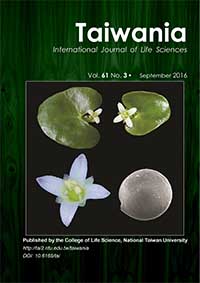Research Paper
Antibacterial activity of some ethno-botanically important ferns of Southern Assam, India
Kathakali Nath, Mrinal Kanti Bhattacharya and Sanjib Kar
Published on: 23 August 2016
Page: 260 - 268
DOI: 10.6165/tai.2016.61.260
Abstract
Pteridophytes form an important part of the biodiversity of this blue green planet. It has been agreed by recent workers that pteridophytic population of India is about 10% of the total pteridophytic flora of the world. Besides showing economic values towards food and fodder, indicators, bio fertilizers, insect repellents etc. quiet a large number of pteridophytic species are used by different communities as medicine and folk medicines. They treat cuts and wounds and many other diseases with leaf extract/rhizome extract of pteridophytes. The tribal people of Barak Valley area of Southern Assam, are using different species of pteridophytes to cure various diseases. In the present communication, total 21 species of common pteridophytes were enumerated from Barak Valley. The ethnobotanical importance of these species as reported by different authors were reviewed and presented in tabulated form. Further, frond extract of these species were tested against five potentially pathogenic microorganisms. The result showed that 10 species have antibacterial activity against one or more organisms while the remaining 11 species did not show any activity against any of the test organisms. The ferns showing antibacterial activity are Adiantum capillus-veneris, Asplenium nidus, Cyathea brunoniana, Cyathea gigantea, Dipteris wallichii, Drynaria quercifolia, Lygodium japonicum, Lygodium flexuossum, Pityrograma calomelanos, and Pteris biaurita.
Keyword: Antibacterial screening, ethno-botany, Ferns, India, Southern Assam.


